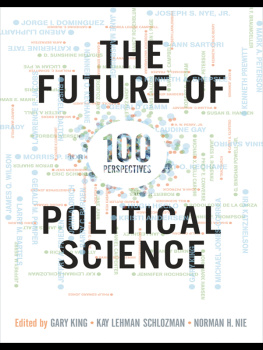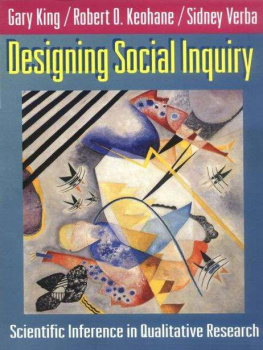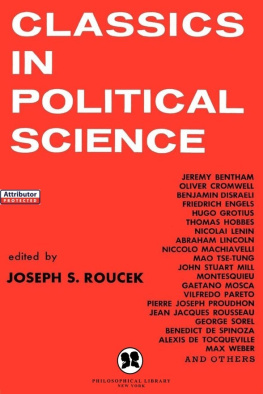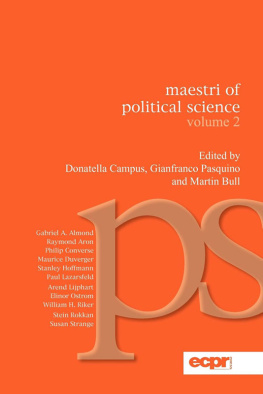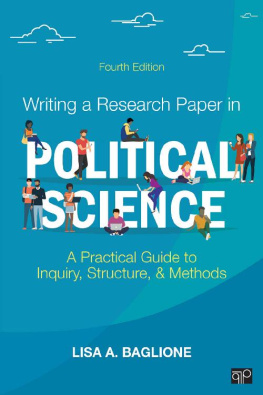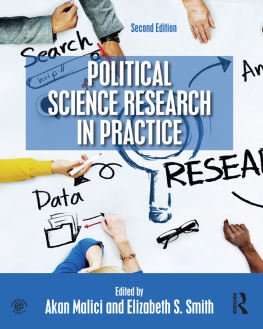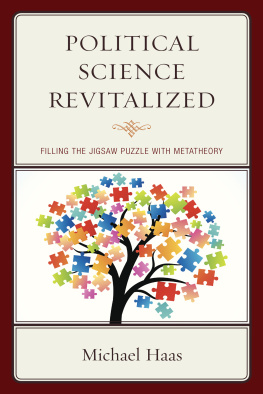THE FUTURE OF POLITICAL SCIENCE
This book contains some of the newest, most exciting ideas now percolating among political scientists, from hallway conversations to conference room discussions. To spur future research, enrich classroom teaching, and direct non-specialist attention to cutting-edge ideas, a distinguished group of authors from various parts of this sprawling and pluralistic discipline has each contributed a brief essay about a single novel or insufficiently appreciated idea on some aspect of political science. The 100 essays are concise, no more than a few pages apiece, and informal. While the contributions are highly diverse, readers can find unexpected connections across the volume, tracing echoes as well as diametrically opposed points of view. This book offers compelling points of departure for everyone who is concerned about political sciencewhether as a scholar, teacher, student, or interested reader.
Gary King is David Florence Professor of Government at Harvard University.
Kay Lehman Schlozman is J. Joseph Moakley Professor of Political Science at Boston College.
Norman H. Nie is Research Professor of Political Science at Stanford University and Professor Emeritus at the University of Chicago.
THE FUTURE OF POLITICAL SCIENCE
100 Perspectives
Edited by
Gary King, Harvard University
Kay Lehman Schlozman, Boston College
Norman H. Nie, Stanford University
First published 2009
by Routledge
270 Madison Ave, New York, NY 10016
Simultaneously published in the UK
by Routledge
2 Park Square, Milton Park, Abingdon, Oxon OX14 4RN
Routledge is an imprint of the Taylor & Francis Group, an informa business
This edition published in the Taylor & Francis e-Library, 2009.
To purchase your own copy of this or any of Taylor & Francis or Routledges collection of thousands of eBooks please go to www.eBookstore.tandf.co.uk.
2009 Taylor & Francis
All rights reserved. No part of this book may be reprinted or reproduced or utilised in any form or by any electronic, mechanical, or other means, now known or hereafter invented, including photocopying and recording, or in any information storage or retrieval system, without permission in writing from the publishers.
Trademark Notice: Product or corporate names may be trademarks or registered trademarks, and are used only for identification and explanation without intent to infringe.
Library of Congress Cataloging in Publication Data
The future of political science:100 perspectives/Gary King, Kay Lehman Schlozman, and Norman H. Nie, editors.
p. cm.
Includes bibliographical references and index.
1. Political science. I. King, Gary, 1958 II. Schlozman, Kay Lehman, 1946 III. Nie, Norman H.
JA71.F89 2009
320dc22 2008035563
ISBN 0-203-88231-8 Master e-book ISBN
ISBN10: 0-415-99700-3 (hbk)
ISBN10: 0-415-99701-1 (pbk)
ISBN10: 0-203-88231-8 (ebk)
ISBN13: 978-0-415-99700-3 (hbk)
ISBN13: 978-0-415-99701-0 (pbk)
ISBN13: 978-0-203-88231-3 (ebk)
ACKNOWLEDGMENTS
Any project involving so many authors, especially one involving 102 academics, is bound to be complicated. We are grateful to them for (mostly!) having eased the job by answering our repeated communications, following our rules, honoring the deadlines and, most importantly, producing thoughtful and stimulating essays. We thank Beverly MacMillen for superb assistance in keeping in touch with the authors, following who owed what when, and tracking various parts of the manuscript in bringing this book to fruition. We also thank our students, including Justin Grimmer at Harvard, who assisted in the development of our automated text analysis routines, Daniel Geary and Kathryn Smith of Boston College for assistance in copy-editing and specifying links between individual essays, and Curtiss L. Cobb and Daniel Butler at Stanford for helping make an initial hand-categorization of the essays into rubrics familiar to political scientists. Finally, our thanks go to Michael Kerns, our editor at Routledge who immediately saw the potential in our unconventional book proposal, and to his expert team, including Felisa Salvago-Keyes, Sin Findlay, and Heidi Cormode.
GK
KLS
NHN
July, 2008
AN INTRODUCTION TO
THE FUTURE OF POLITICAL
SCIENCE
Gary King, Kay Lehman Schlozman, Norman H. Nie
This book highlights many new ideas about possible future research directions in the discipline of political science. Unlike most books, the ideas presented here are intended to be at the earliest, most formative stage before sustained research backs them up or knocks them down. Some may be completely wrong, but all are worth considering. To identify and evaluate ideas like these is crucial to our enterpriseto scholars considering promising directions for their next research projects, graduate students searching for dissertation topics, undergraduates seeking a subject for an honors thesis, teachers looking for innovative courses to add to the curriculum, colleagues proposing faculty slots, deans evaluating those proposals, and anyone seeking a differentiated, expansive, and thoughtful view of where the discipline of political science is headed. In that rare moment when your routine academic responsibilities are not consuming every waking moment, you are alone at your desk, and you have a moment to consider your future intellectual direction, perhaps you will find something in these 100 essays to move your agenda along.
The Future of Political Science: 100 Perspectives presents brand new or insufficiently appreciated ideas about some aspect of the discipline. Many of these ideas represent what at least one author thinks other political scientists should know but may not: because it derives from another subfield, has gotten lost in the publication onslaught, has not before appeared in print, or has been published but overlooked. Some of the ideas represent what at least one author thinks nonpolitical scientists should know, that is, something that is well known, at least to some political scientists, of which policymakers, journalists, or the public at large would do well to take note and that, in turn, should also cause other political scientists to pay attention.
More specifically, we posed the following two questions and asked a group of political scientists each to choose one of them to answer in a brief essay:
- To what as-yet-unanswered question should your area of political science devote more effort?
- What is one finding, substantive or methodological, from political science (or a specified subfield within political science) that you wish were more widely knownby, for example, the media, public officials, voters, academics in another discipline, or other political scientists?
We encouraged each contributor to write a brief, informal, risky speculation instead of a formal, documented analysis, and we limited each contribution to about 1000 words. Our goal is to present and spark new thinking and inquiry, not to summarize the discipline as it is today. The authors we selected represent biased views of the discipline, both individually and collectively, but it is precisely these biases about the future that we hope to convey. Other authors would certainly focus on a different set of ideas. Since the point of this book is to incubate and discover emerging ideas in political science, we did not dictate the agenda by choosing a series of topics and, then, selecting authors to expound on our pre-conceived themes. Instead, we selected the authors first and they generated the essays, which constitute one group of answers to the questions we posed to them.

